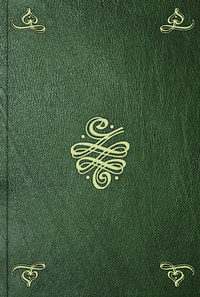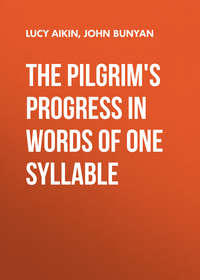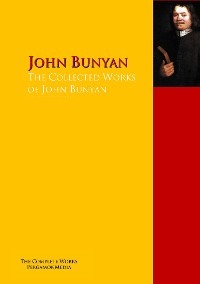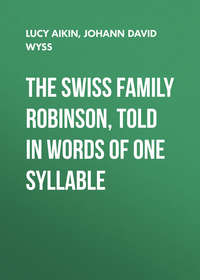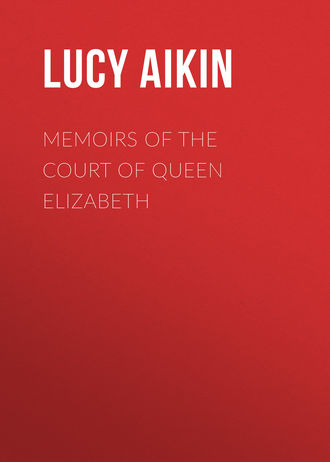 полная версия
полная версияMemoirs of the Court of Queen Elizabeth
Henry third earl of Huntingdon of the family of Hastings died about the same time. By his mother, eldest daughter and coheiress of Henry Pole lord Montacute, he was the representative of the Clarence branch of the family of Plantagenet; but no pretensions of his had ever awakened anxiety in the house of Tudor. He was a person of mild disposition, greatly attached to the puritan party, which, bound together by a secret compact, now formed a church within the church; he is said to have impaired his fortune by his bounty to the more zealous preachers; and be largely contributed by his will to the endowment of Emanuel college, the puritanical character of which was now well known.
Richard Fletcher bishop of London, "a comely and courtly prelate," who departed this life in the same year, affords a subject for a few remarks. It was a practice of the more powerful courtiers of that day, when the lands of a vacant see had excited, as they seldom failed to do, their cupidity, to "find out some men that had great minds and small means or merits, that would be glad to leave a small deanery to make a poor bishopric, by new leasing lands that were almost out of lease119;" and on these terms, which more conscientious churchmen disdained, Fletcher had taken the bishopric of Oxford, and had in due time been rewarded for his compliance by translation first to Worcester and afterwards to London. His talents and deportment pleased the queen; and it is mentioned, as an indication of her special favor, that she once quarrelled with him for wearing too short a beard. But he afterwards gave her more serious displeasure by taking a wife, a gay and fair court lady of good quality; and he had scarcely pacified her majesty by the propitiatory offering of a great entertainment at his house in Chelsea, when he was carried off by a sudden death, ascribed by his contemporaries to his immoderate use of the new luxury of smoking tobacco. This prelate was the father of Fletcher the dramatic poet.
Bishop Vaughan succeeded him, of whom Harrington gives the following trait: "He was an enemy to all supposed miracles, insomuch as one arguing with him in the closet at Greenwich in defence of them, and alleging the queen's healing of the evil for an instance, asking him what he could say against it, he answered, that he was loth to answer arguments taken from the topic-place of the cloth of estate; but if they would urge him to answer, he said his opinion was, she did it by virtue of some precious stone in possession of the crown of England that had such a natural quality. But had queen Elizabeth been told that he ascribed more virtue to her jewels (though she loved them well) than to her person, she would never have made him bishop of Chester."
Of the justice of the last remark there can be little question. In this reign, the royal pretension referred to, was asserted with unusual earnestness, and for good reasons, as we learn from a different authority. In 1597 a quarto book appeared, written in Latin and dedicated to her majesty by one of her chaplains, which contained a relation of the cures thus performed by her; in which it is related, that a catholic having been so healed went away persuaded that the pope's excommunication of her majesty was of no effect: "For if she had not by right obtained the sceptre of the kingdom, and her throne established by the authority and appointment of God, what she attempted could not have succeeded. Because the rule is, that God is not any where witness to a lie120." Such were the reasonings of that age.
It is probably to bishop Vaughan also that sir John Harrington refers in the following article of his Brief Notes.
"One Sunday (April last) my lord of London preached to the queen's majesty, and seemed to touch on the vanity of decking the body too finely. Her majesty told the ladies, that if the bishop held more discourse on such matters, she would fit him for heaven, but he should walk thither without a staff, and leave his mantle behind him. Perchance the bishop hath never sought her highness' wardrobe, or he would have chosen another text121."
CHAPTER XXVI
1597 AND 1598Fresh expedition against Spain proposed.—Extracts from Whyte's letters.—Raleigh reconciles Essex and R. Cecil.—Essex master of the ordnance.—Anecdote of the queen and Mrs. Bridges.—Preparations for the expedition.—Notice of lord Southampton.—Ill success of the voyage.—Quarrel of Essex and Raleigh.—Displeasure of the queen.—Lord admiral made earl of Nottingham.—Anger of Essex.—He is declared hereditary earl marshal.—Reply of the queen to a Polish ambassador.—to a proposition of the king of Denmark.—State of Ireland.—Treaty of Vervins.—Agreement between Cecil and Essex.—Anecdotes of Essex and the queen.—Their quarrel.—Letter of Essex to the lord keeper.—Dispute between Burleigh and Essex.—Agreement with the Dutch.—Death and character of Burleigh.—Transactions between the queen and the king of Scots, and an extract from their correspondence.—Anecdote of sir Roger Aston and the queen.—Anecdote of archbishop Hutton.—Death of Spenser.—Hall's satires.—Notice of sir John Harrington.—Extracts from his note-book.
A fresh expedition against the Spaniards was in agitation from the beginning of this year, which occasioned many movements at court, and, as usual, disturbed the mind of the queen with various perplexities. Her captious favor towards Essex, and the arts employed by him to gain his will on every contested point, are well illustrated in the letters of Rowland White, to which we must again recur.
On February twenty-second he writes: "My lord of Essex kept his bed the most part of all yesterday; yet did one of his chamber tell me, he could not weep for it, for he knew his lord was not sick. There is not a day passes that the queen sends not often to see him, and himself every day goeth privately to her." Two days after, he reports that "my lord of Essex comes out of his chamber in his gown and night-cap.... Full fourteen days his lordship kept in; her majesty, as I heard, resolved to break him of his will and to pull down his great heart, who found it a thing impossible, and says he holds it from the mother's side; but all is well again, and no doubt he will grow a mighty man in our state."
The earl of Cumberland made "some doubt of his going to sea," because lord Thomas Howard and Raleigh were to be joined with him in equal authority; the queen mentioned the subject to him, and on his repeating to herself his refusal, he was "well chidden."
In March, Raleigh was busied in mediating a reconciliation between Essex and Robert Cecil, in which he was so far successful that a kind of compromise took place; and henceforth court favors were shared without any open quarrels between their respective adherents. The motives urged by Raleigh for this agreement were, that it would benefit the country; that the queen's "continual unquietness" would turn to contentment, and that public business would go on to the hurt of the common enemy.
Essex however was malcontent at heart; he began to frequent certain meetings held in Blackfriars at the house of lady Russel, a busy puritan, who was one of the learned daughters of sir Anthony Cook. "Wearied," says White, "with not knowing how to please, he is not unwilling to listen to those motions made him for the public good." He was soon after so much offended with her majesty for giving the office of warden of the cinque ports to his enemy lord Cobham, after he had asked it for himself, that he was about to quit the court; but the queen sent for him, and, to pacify him, made him master of the ordnance.
It is mentioned about this time, that the queen had of late "used the fair Mrs. Bridges with words and blows of anger." This young lady was one of the maids of honor, and the same referred to in a subsequent letter, where it is said, "it is spied out by envy that the earl of Essex is again fallen in love with his fairest B." On which White observes, "It cannot choose but come to the queen's ears; and then is he undone, and all that depend upon his favor." A striking indication of the nature of the sentiment which the aged sovereign cherished for her youthful favorite!
In May our intelligencer writes thus: "Here hath been much ado between the queen and the lords about the preparation to sea; some of them urging the necessity of setting it forward for her safety; but she opposing it by no danger appearing towards her any where; and that she will not make wars but arm for defence; understanding how much of her treasure was already spent in victual, both for ships and soldiers at land. She was extremely angry with them that made such haste in it, and at Burleigh for suffering it, seeing no greater occasion. No reason nor persuasion by some of the lords could prevail, but that her majesty hath commanded order to be given to stay all proceeding, and sent my lord Thomas (Howard) word that he should not go to sea. How her majesty may be wrought to fulfil the most earnest desire of some to have it go forward, time must make it known."
But the reconciliation, whether sincere or otherwise, brought about by Raleigh between Essex and the Cecils, rendered at this time the war-party so strong, that the scruples of the queen were at length overruled, and a formidable armament was sent to sea, with the double object of destroying the Spanish ships in their harbours and intercepting their homeward-bound West India fleet. Essex was commander in chief by sea and land; lord Thomas Howard and Raleigh vice and rear admirals; lord Montjoy was lieutenant-general; sir Francis Vere, marshal. Several young noblemen attached to Essex joined the expedition as volunteers; as lord Rich his brother-in-law, the earl of Rutland, afterwards married to the daughter of the countess of Essex by sir Philip Sidney; lord Cromwel, and the earl of Southampton. The last, whose friendship for Essex afterwards hurried him into an enterprise still more perilous, appears to have been attracted to him by an extraordinary conformity of tastes and temper. Like Essex, he was brave and generous, but impetuous and somewhat inclined to arrogance:—like him, a munificent patron of the genius which he loved. Like his friend again, he received from her majesty tokens of peculiar favor, which she occasionally suspended on his giving indications of an ungovernable temper or too lofty spirit, and which she finally withdrew, on his presuming to marry without that consent which to certain persons she could never have been induced to accord. This earl of Southampton was grandson of that ambitious and assuming but able and diligent statesman, lord chancellor Wriothesley, appointed by Henry VIII. one of his executors; he was father of the virtuous Southampton lord treasurer, and by him, grandfather of the heroical and ever-memorable Rachel lady Russel.
A storm drove the ill-fated armament back to Plymouth, where it remained wind-bound for a month, and Essex and Raleigh posted together up to court for fresh instructions. Having concerted their measures, they made sail for the Azores, and Raleigh with his division arriving first, attacked and captured the isle of Fayal without waiting for his admiral. Essex was incensed; and there were not wanting those about him who applied themselves to fan the flame, and even urged him to bring sir Walter to a court-martial: but he refused; and his anger soon evaporating, lord Thomas Howard was enabled to accommodate the difference, and the rivals returned to the appearance of friendship. Essex was destitute of the naval skill requisite for the prosperous conduct of such an enterprise: owing partly to his mistakes, and partly to several thwarting circumstances, the West India fleet escaped him, and three rich Havannah ships, which served to defray most of the expenses, were the only trophies of his "Island Voyage," from which himself and the nation had anticipated results so glorious.
The queen received him with manifest dissatisfaction; his severity towards Raleigh was blamed, and it was evident that matters tended to involve him in fresh differences with Robert Cecil. During his absence, the lord admiral had been advanced to the dignity of earl of Nottingham, and he now discovered that by a clause in the patent this honor was declared to be conferred upon him in consideration of his good service at the taking of Cadiz, an action of which Essex claimed to himself the whole merit. To make the injury greater, this title, conjoined to the office of lord high admiral, gave the new earl precedency of all others of the same rank, Essex amongst the rest. To such complicated mortifications his proud spirit disdained to submit; and after challenging without effect to single combat the lord admiral himself or any of his sons who would take up the quarrel, the indignant favorite retired a sullen malcontent to Wanstead-house, feigning himself sick. This expedient acted on the heart of the queen with all its wonted force;—she showed the utmost concern for his situation, chid the Cecils for wronging him, and soon after made him compensation for the act which had wounded him, by admitting his claim to the hereditary office of earl marshal, with which he was solemnly invested in December 1597; and in right of it once more took place above the lord admiral.
It was during this summer that the arrogant deportment of a Polish ambassador, sent to complain of an invasion of neutral rights in the interruption given by the English navy to the trade of his master's subjects with Spain, gave occasion to a celebrated display of the spirit and the erudition of the queen of England. Speed, the ablest of our chroniclers, gives at length her extemporal Latin reply to his harangue; adding in his quaint but expressive phrase, that she "thus lion like rising, daunted the malapert orator no less with her stately port and majestical deporture, than with the tartness of her princely checks: and turning to the train of her attendants thus said, 'God's death, my lords,' (for that was her oath ever in anger,) 'I have been inforced this day to scour up my old Latin, that hath lain long in rusting.'" The same author mentions, that the king of Denmark having by his ambassador offered to mediate between England and Spain, the queen declined the overture, adding, "I would have the king of Denmark and all princes Christian and Heathen to know, that England hath no need to crave peace; nor myself indured one hour's fear since I attained the crown thereof, being guarded with so valiant and faithful subjects." Such was the lofty tone which Elizabeth, to the end of her days, maintained towards foreign powers; none of whom had she cause to dread or motive to court. Yet her cheerfulness and fortitude were at the same time on the point of sinking under the harassing disquietudes of a petty war supported against her by an Irish chief of rebels.
The head of the sept O'Neal, whom she had in vain endeavoured to attach permanently to her interests by conferring upon him the dignity of earl of Tyrone, had now for some years persevered in a resistance to her authority, which the most strenuous efforts of the civil and military governors of this turbulent and miserable island had proved inadequate to overcome. That brave officer sir John Norris, then general of Ulster, had found it necessary to grant terms to the rebel whom he would gladly have brought in bonds to the feet of his sovereign. But the treaty thus made, this perfidious barbarian, according to his custom, observed only till the English forces were withdrawn and he saw the occasion favorable to rise again in arms. Lord Borough, whom the queen had appointed deputy in 1598,—on which sir John Norris, appointed to act under him, died, as it is thought, of chagrin,—began his career with a vigorous attack, by which he carried, though not without considerable loss, the fort of Blackwater, the only place of strength possessed by the rebels; but before he was able to pursue further his success, death overtook him, and the government was committed for a time to the earl of Ormond. Tyrone, nothing daunted, laid siege in his turn to Blackwater; and sir Henry Bagnal, with the flower of the English army, being sent to relieve it, sustained the most signal defeat ever experienced by an English force in Ireland. The commander himself, several captains of distinction and fifteen hundred men, were left on the field; and the fort immediately surrendered to the rebel chief, who now vauntingly declared, that he would accept of no terms from the queen of England, being resolved to remain in arms till the king of Spain should send forces to his assistance.
Such was the alarming position of affairs in this island at the conclusion of the year 1598. At home, several incidents had intervened to claim attention.
The king of France had received from Spain proposals for a peace, which the exhausted state of his country would not permit him to neglect; and he had used his utmost endeavours to persuade his allies, the queen of England and the United Provinces, to enter into the negotiations for a general pacification. But Philip II. still refused to acknowledge the independence of his revolted subjects, the only basis on which the new republic would condescend to treat. Elizabeth, besides that she disdained to desert those whom she had so long and so zealously supported, was in no haste to terminate a war from which she and her subjects anticipated honor with little peril, and plunder which would more than repay its expenses; and both from England and Holland agents were sent to remonstrate with Henry against the breach of treaty which he was about to commit by the conclusion of a separate peace. Elizabeth wrote to admonish him that the true sin against the Holy Ghost was ingratitude, of which she had so much right to accuse him; that fidelity to engagements was the first of duties and of virtues; and that union, according to the ancient apologue of the bundle of rods, was the source of strength. But to all her eloquence and all her invectives Henry had to oppose the necessity of his affairs, and the treaty of Vervins was concluded; but not without some previous stipulations on the part of the French king which softened considerably the resentment of his ally. Of the commissioners named by Elizabeth to arrange this business with Henry, Robert Cecil was the chief; who held before his departure many private conferences with Essex, and would not move from court till he had bound him by favors and promises to do him no injury by promoting his enemies in his absence. The earl of Southampton having given some offence to her majesty for which she had ordered him to absent himself awhile from court, took the opportunity to obtain license to travel, and attended the secretary to France, perhaps in the character of a spy upon his motions on behalf of Essex, who seems to have prepared him for the service by much private instruction.
"I acquainted you," says Rowland Whyte to his correspondent, "with the care had to bring my lady of Leicester to the queen's presence. It was often granted, and she brought to the privy galleries, but the queen found some occasion not to come. Upon Shrove Monday the queen was persuaded to go to Mr. Comptroller's at the tilt end, and there was my lady of Leicester with a fair jewel of three hundred pounds. A great dinner was prepared by my lady Chandos; the queen's coach ready, and all the world expecting her majesty's coming; when, upon a sudden, she resolved not to go, and so sent word. My lord of Essex that had kept his chamber all the day before, in his nightgown went up to the queen the privy way; but all would not prevail, and as yet my lady Leicester hath not seen the queen. It had been better not moved, for my lord of Essex, by importuning the queen in these unpleasing matters, loses the opportunity he might take to do good unto his ancient friends." But on March 2d he adds; "My lady Leicester was at court, kissed the queen's hand and her breast, and did embrace her, and the queen kissed her. My lord of Essex is in exceeding favor here. Lady Leicester departed from court exceedingly contented, but being desirous again to come to kiss the queen's hand, it was denied, and, as I heard, some wonted unkind words given out against her."
This extraordinary height of royal favor was not merely the precursor, but, by the arrogant presumption with which it inspired him, a principal cause of Essex's decline, which was now fast approaching. Confident in the affections of Elizabeth, he suffered himself to forget that she was still his queen and still a Tudor; he often neglected the attentions which would have gratified her; on any occasional cause of ill humour he would drop slighting expressions respecting her age and person which, if they reached her ear, could never be forgiven; on one memorable instance he treated her with indignity openly and in her presence. A dispute had arisen between them in presence of the admiral, the secretary, and the clerk of the signet, respecting the choice of a commander for Ireland; the queen resolving to send sir William Knolles, the uncle of Essex, while he vehemently supported sir George Carew, because this person, who was haughty and boastful, had given him some offence; and he wanted to remove him out of his way. Unable either by argument or persuasion to prevail over the resolute will of her majesty, the favorite at last forgot himself so far as to turn his back upon her with a laugh of contempt; an outrage which she revenged after her own manner, by boxing his ears and bidding him "Go and be hanged." This retort so inflamed the blood of Essex that he clapped his hand on his sword, and while the lord admiral hastened to throw himself between them, he swore that not from Henry VIII. himself would he have endured such an indignity, and foaming with rage he rushed out of the palace. His sincere friend the lord keeper immediately addressed to him a prudential letter, urging him to lose no time in seeking with humble submissions the forgiveness of his offended mistress: but Essex replied to these well intended admonitions by a letter which, amid all the choler that it betrays, must still be applauded both for its eloquence and for a manliness of sentiment of which few other public characters of the age appear to have been capable. The lord keeper in his letter had strongly urged the religious duty of absolute submission on the part of a subject to every thing that his sovereign, justly or unjustly, should be pleased to lay upon him; to which the earl thus replies: "But, say you, I must yield and submit. I can neither yield myself to be guilty, or this imputation laid upon me to be just. I owe so much to the author of all truth, as I can never yield falsehood to be truth, or truth to be falsehood. Have I given cause, ask you, and take scandal when I have done? No; I gave no cause to take so much as Fimbria's complaint against me, for I did totum telum corpore recipere. I patiently bear all, and sensibly feel all, that I then received, when this scandal was given me. Nay more, when the vilest of all indignities are done unto me, doth religion enforce me to sue? or doth God require it? Is it impiety not to do it? What, cannot princes err? cannot subjects receive wrong? Is an earthly power or authority infinite? Pardon me, pardon me, my good lord, I can never subscribe to these principles. Let Solomon's fool laugh when he is stricken; let those that mean to make their profit of princes, show to have no sense of princes' injuries; let them acknowledge an infinite absoluteness on earth, that do not believe in an absolute infiniteness in heaven. As for me, I have received wrong, and feel it. My cause is good; I know it; and whatsoever come, all the powers on earth can never show more strength and constancy in oppressing, than I can show in suffering whatsoever can or shall be imposed upon me." &c.
Several other friends of Essex, his mother, his sister and the earl of Northumberland her husband, urged him in like manner to return to his attendance at court and seek her majesty's forgiveness; while she, on her part, secretly uneasy at his absence, permitted certain persons to go to him, as from themselves, and suggest terms of accommodation. Sir George Carew was made lord president of Munster; and sir William Knolles, who perhaps had not desired the appointment, assured his nephew of his earnest wish to serve him. Finally, this great quarrel was made up, we scarcely know how, and Essex appeared as powerful at court as ever; though some have believed, and with apparent reason, that from this time the sentiments of the queen for her once cherished favorite, partook more of fear than of love; and that confidence was never re-established between them.


